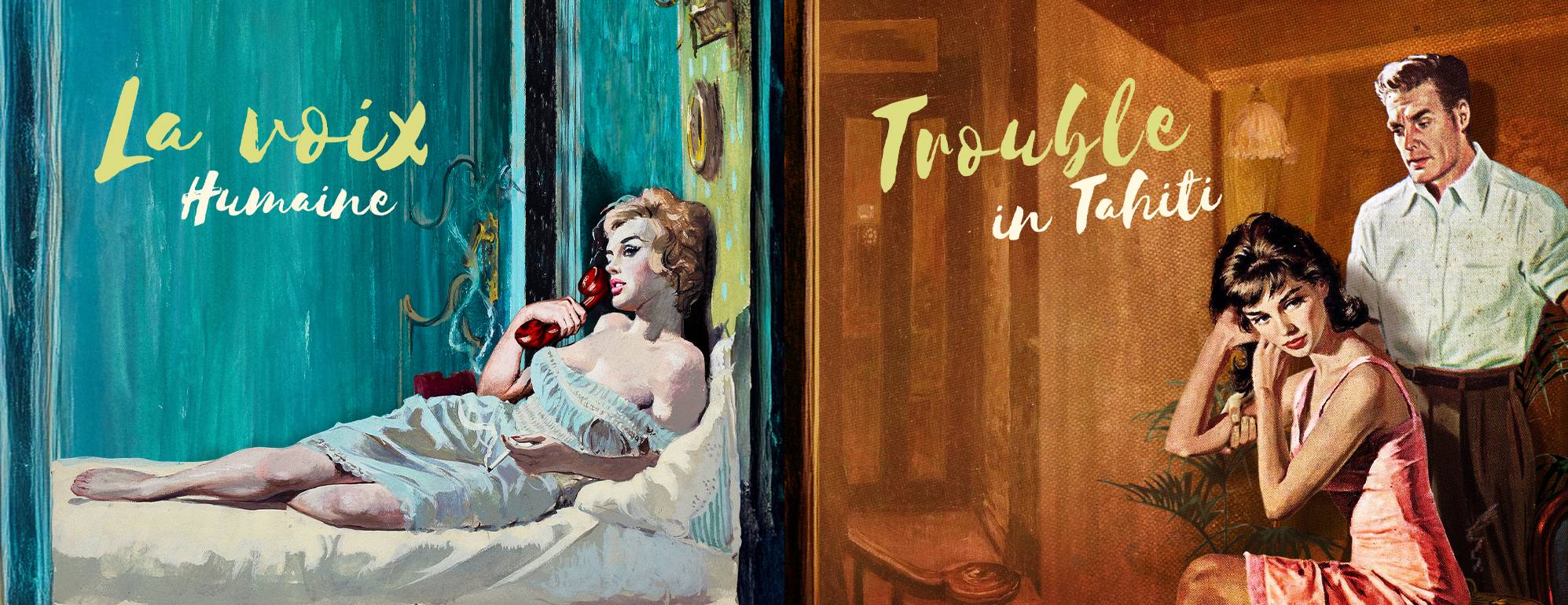We caught up with the Daisy Evans Director of the fantastic Opera Double Bill: Trouble in Tahiti / La voix humaine, coming to Norwich Theatre Royal on 2 & 3 Sep. We dove deep into why these two operas are such a brilliant match, how they totally nail the modern human experience, and how they’ve managed to weave them into one unforgettable evening.
Why do La voix humaine and Trouble in Tahiti complement each other so well?
It’s a fantastic pairing. Both operas are about modern loneliness and how technology is shaping and changing our lives, perhaps for the worse?
Even though we are setting both pieces in the time they were written – mid to the late 50s – I think a lot of the themes are really relevant to us still, if not more relevant than they might have been at the time. They both explore different sides of the same coin.

Do you have to do much to the stage to link one to the other?
I’ve set them in the same apartment building. The idea being that the one woman who sings in La voix humaine lives further up in the building to the family that we see in Trouble in Tahiti. And they are linked so you see both lives in both halves.
I like to think of the evening as one opera, rather than two separate operas. It’s one opera written by two separate composers, but they are working together. Our set designer, Lauren Elstein has done a brilliant job of designing a set that flips from one home to the other. And Edward Hopper has been an important influence. Big shiny social spaces with one or two people inside. That feels, to me, like contemporary loneliness.

Both operas explore intimate psychological states—how did you approach creating distinct yet complementary emotional worlds on stage?
I watched a run of them both recently and yes, they are very contrasting – for a start, one is American and one is a French – but once you are inside the piece, you don’t feel it’s a jump between the two at all. The languages are different but I think the audience will see through that, the languages are just a film if you like.
How do you see these operas speaking to modern audiences, especially in the context of relationships, isolation, and communication?
In Trouble in Tahiti we have an aria that’s in pursuit of a quiet place. And that seems to be a universal thing now. We have lost our ability to be in a quiet place. If we are on our own we need music and podcasts or we need to call someone. We have constant connectivity if we want it; in the car, at home. I think we all need a quiet place to truly confront ourselves and space to analyse how we have got where we are and how we can move forward. If we can’t have quiet, we are in crisis. And I think society is in social crisis now. It’s very contemporary in that way.
And the phone in La voix humaine is the new technology of the moment. Ella seeks validation through the phone. How poignant is that?
I knew the route I wanted the pieces to go down but that has been reinforced and improved during the rehearsal process. It’s been like panning for gold. My really fantastic principals have brought their own experiences to the production and there is a lot of gold. It’s so relevant to today.
Did you face any particular challenges in transitioning between the sparse, solo nature of La voix humaine and the more satirical ensemble feel of Trouble in Tahiti?
I use everybody in both operas which is a really welcome production feature for me. If I was just featuring La voix humaine on its own, there would be an immense pressure on both me and the singer to create texture and dynamic. Having created a world (apartment block) where the Trouble in Tahiti cast can also exist in the La voix humaine cast, there are lots of opportunities for clever interactions. Voices on the radio, voices in your mind.. you’lll see, there’s all sorts going on.

Is there something about this production—or these operas—that audiences might not know. Any surprises or revelations?
Yes. We have filled in a lot of the gaps with what people do off-stage in this production. We’ve created a lot of “extra-ness” to the stories. You have what you see. And you have what you don’t see.

Why should we come?
It’s a very cathartic piece of theatre. You will feel something if you come and see this. It’s not light-hearted, it’s drama. It’s extraordinary.
We have three incredibly strong principals – Allison Cook, Charles Rice and Hanna Hipp – they are so experienced and they are real actors, who sing. It’s amazing to watch them – they give their absolute all, really show-stopping performances. And this is Buxton, so you are right up close and personal experiencing these pieces. And the trio is made up of three very talented young artists, so we have it all. It’s been a privilege to work with them all.
Double Bill: Trouble in Tahiti/La voix humaine is at Norwich Theatre Royal between 2 & 3 Sep. For more information or to book, visit norwichtheatre.org or call the Box Office on 01603 630 000.

